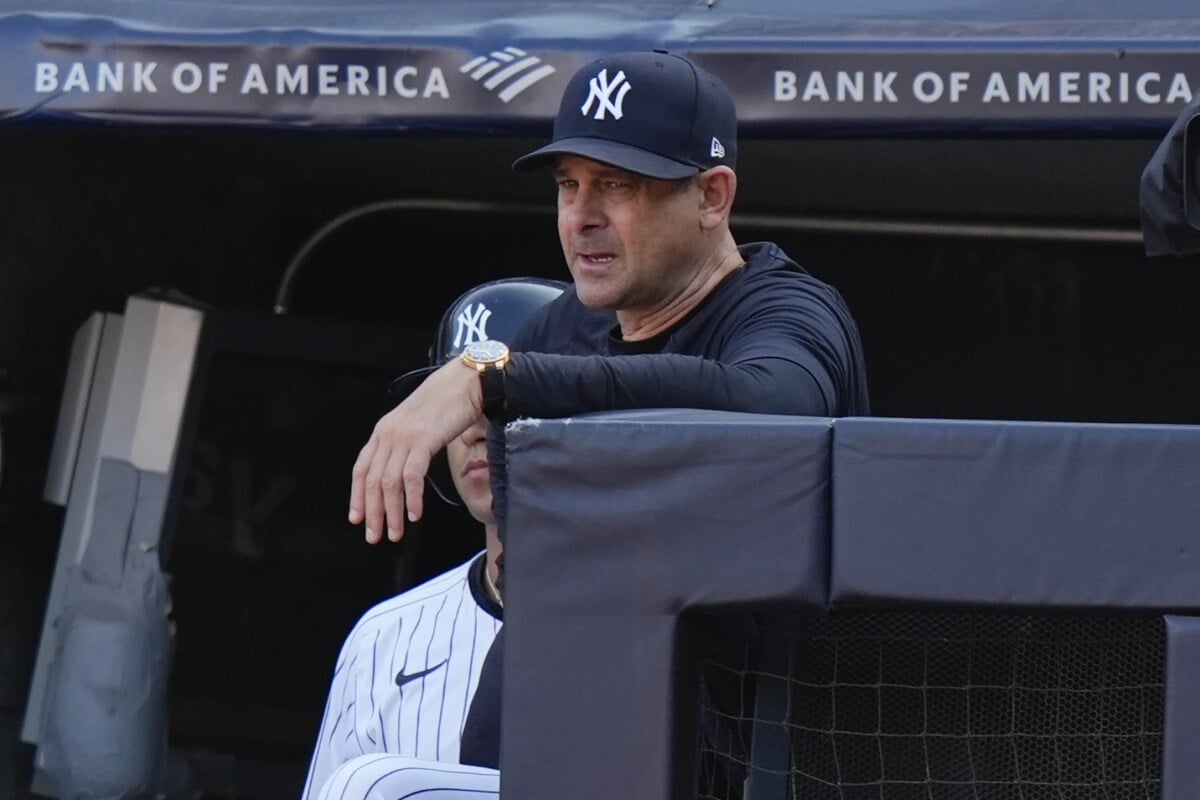Gerrit Cole’s mea culpa fails to erase Kay’s question as Yankees ace’s mistake under scrutiny


Sara Molnick
More Stories By Sara Molnick
- Mother’s Day: How Anthony Volpe’s mom molded him into a Yankee phenom
- Juan Soto meets with Yankees leadership as Dodgers join star-studded free agent chase
- Yankees’ Luis Gil joins elite company with AL Rookie of the Year win
- Yankees prep for Rule 5 draft by adding two players to MiLB roster
- CC Sabathia makes Hall of Fame ballot debut, headlining Yankees-heavy 2025 class
Table of Contents
Yankees broadcaster Michael Kay expressed surprise over Gerrit Cole’s decision to intentionally walk Rafael Devers in Saturday’s 7-1 loss to the Red Sox. Kay voiced his disbelief during the broadcast, questioning the move given that there was only one out and no runners on base at the time.
“That’ll bring up Devers,” Kay shouted in the Yankees booth as the Red Sox infielder returned in the fourth. “And they intentionally walk him?! With nobody on and one out?”
The Yankees voice referenced Gerrit Cole’s previous comments, where the pitcher acknowledged Devers as the most challenging Latin hitter he had ever faced. Devers’ dominance against Cole, with a .341 average and eight home runs in 41 at-bats, made the decision to walk him even more puzzling.
The strategy appeared to backfire, as Devers ended up playing a pivotal role in Boston’s win, tallying two hits, two RBIs, and two walks. Commentators Matt Vasgersian and Tom Verducci, calling the game for MLB Network, also questioned Gerrit Cole’s choice, with Verducci noting that the Yankees ace himself signaled for the walk, signaling his desire to avoid Devers altogether.
“He’s putting him on, he’s intentionally walking [him]” Verducci said. “It was Gerrit Cole who put up the four fingers. Gerrit Cole put up four fingers and pointed to first base. I want no part of you.”
Adding to the drama, Gerrit Cole had hit Devers with a pitch in the first inning, which Red Sox manager Alex Cora criticized after the game. Cora argued that the hit-by-pitch was intentional and pointed to the later intentional walk as further evidence of the Yankees ace’s reluctance to face Devers.
Gerrit Cole’s decision dooms Yankees, starts the blame game
Gerrit Cole, the reigning AL Cy Young Award winner, made a pivotal decision to intentionally walk Rafael Devers in the fourth inning, which quickly shifted the game’s momentum. The ace pitcher had been cruising, retiring nine of the previous 10 batters, but the walk set the stage for a Red Sox three-run rally.
On Hispanic Heritage Day, Gerrit Cole was asked which Latin hitter has given him the most trouble in his career:
— Yankees Videos (@snyyankees) September 10, 2024
"Rafael Devers" 😂 pic.twitter.com/RAXLVIRaJj
Things went from bad to worse in the fifth inning, when Devers delivered a two-run single that effectively ended Gerrit Cole’s outing. The Yankees star’s final line was well below his usual standards—he lasted just 4 1/3 innings, surrendering five hits and seven earned runs, while walking three and striking out only two.
After the 7-1 loss to the Red Sox, Yankees manager Aaron Boone acknowledged that there had been pre-game discussions about walking Devers in certain situations, but he did not agree with Gerrit Cole’s choice to issue the free pass at that moment. Boone explained that, after the Yankees scored in the third inning, he would have preferred to challenge Devers directly. He noted Gerrit Cole seemed indecisive before opting for the walk.
“Once we scored the run [in the third inning], my preference would have been: Let’s attack him,” the Yankees manager claimed. “Gerrit was a little indecisive out there and rolled with it.”
Gerrit Cole’s decision is unforgivable

The Yankees’ decision to intentionally walk Rafael Devers in the fourth inning of Saturday’s loss to the Red Sox remains a source of confusion and controversy, with explanations still failing to clarify the situation. Gerrit Cole, who had been in control of the game, signaled for the intentional walk in what many viewed as an unusually passive approach, despite manager Aaron Boone describing it as part of an “aggressive” strategy.
Accounts of how the decision unfolded have been inconsistent. Catcher Austin Wells said he was unaware of any pre-game plan to walk Devers in that situation, while Boone admitted he would have preferred to challenge Devers but didn’t step in when Gerrit Cole made the call.
Gerrit Cole, however, claimed that he had discussed the scenario with Boone and pitching coach Matt Blake during the previous half-inning, leading to further confusion.
The conflicting narratives suggest either a major breakdown in communication or an effort to deflect blame. Whatever the case, the choice to walk Devers, followed by the disastrous inning that ensued, has been criticized as a misstep with weak justifications.
The decision wiped out the positive momentum the Yankees had built after a series of thrilling victories, including back-to-back extra-inning walk-offs and a grand slam from Aaron Judge the night before. After the 7-1 defeat, the mood in the clubhouse was somber, with Boone taking an unusually long time to speak to reporters and Cole delaying his own comments by over 45 minutes.
Summing up the day as “rough,” Gerrit Cole downplayed the full scope of the situation, which has raised serious questions about the team’s decision-making process and the importance of clear communication in critical moments. The episode could have lasting effects on team dynamics and future strategy.
The Yankees’ struggles in their 7-1 loss went far beyond the controversial intentional walk. The offense continued to falter, managing just one run despite a strong lineup, while sloppy baserunning and mental lapses further derailed their performance. Alex Verdugo made a costly mistake in the third inning, trying to stretch a single into a double but only accelerating after rounding first base. Jazz Chisholm Jr. lost track of the outs while on first in the second inning, leading to a pickoff in a crucial fourth-inning situation. Jasson Dominguez, in the seventh, was caught off guard when Jarren Duran tagged up from first.

Yet, the decision to intentionally walk Rafael Devers in the fourth inning overshadowed these miscues. With the Yankees leading 1-0, Gerrit Cole had been pitching efficiently, having allowed no hits through 35 pitches. The only baserunner to that point was Devers, who had been hit by a pitch in the first inning. Despite Devers’ career success against Gerrit Cole—eight home runs—he had also struck out 15 times against him and was in the midst of a slump, hitting just .175 with no home runs in his last 15 games.
Manager Aaron Boone hinted that there had been discussions about intentionally walking Devers in unusual situations, but the timing of the decision raised eyebrows. Gerrit Cole’s explanation that they wanted to conserve the bullpen and pitch efficiently didn’t seem to justify the move, particularly with the ace dominating at the time.
Notably, Gerrit Cole had issued only one intentional walk since 2017, during his time with the Pirates. That came in Game 1 of the 2020 Division Series when he walked Ji-Man Choi after Choi had already homered. The stakes in that situation were vastly different from a regular-season game in September, where Cole and the Yankees held the upper hand.
Critics have slammed the move as overthinking, relying on a predetermined strategy rather than reading the situation. It has led to questions about the Yankees’ ability to make effective in-game decisions and the psychological toll it may have taken on both Gerrit Cole and the team. The fallout from the decision has left many wondering if it was a critical misstep in the Yankees’ playoff push.

The intentional walk to Rafael Devers marked a pivotal shift in the Yankees‘ loss, turning what had been a well-controlled game into a chaotic unraveling. Before the decision, Boston was hitless in nine at-bats, with their only baserunner coming from a hit-by-pitch. But once Devers was intentionally walked, the Red Sox offense ignited, going 5-for-7, drawing two walks, getting hit by two pitches, and stealing two bases. Devers, surprisingly, swiped his third bag of the season—his first since July—catching the Yankees flat-footed. This seven-run explosion worsened Gerrit Cole’s ERA against Boston to 6.06 over 15 starts as a Yankee, including the postseason.
Within the Yankees, the consensus was clear: the intentional walk disrupted Gerrit Cole’s groove and shifted momentum in Boston’s favor. This decision unraveled what could have been the Yankees’ first four-game winning streak since late July, leaving the team disjointed with just two weeks left in the season.
Alex Cora goes off on Gerrit Cole after the game.
— Tyler Milliken ⚾️ (@tylermilliken_) September 14, 2024
Says Cole didn't want to face Devers. The intentional walk after the hit by pitch proved that.
Wow. pic.twitter.com/YnY7xtMIDJ
The decision-making behind the walk has been heavily scrutinized. None of the key figures—Wells, Cole, or Boone—intervened to stop what many viewed as a tactical blunder. Their post-game explanations were seen as half-hearted, with each party accepting partial responsibility but avoiding full accountability.
What do you think? Leave your comment below.
- Categories: gerrit cole, Yankees vs. Red Sox
- Tags: gerrit cole, Yankees vs. Red Sox
Related posts:


 Follow Us
Follow Us









